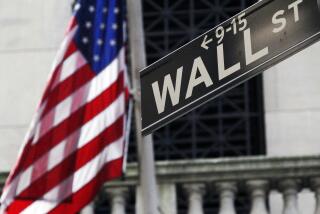Foreseeing a 13,000 Dow by Dec. 31?
- Share via
It’s Dec. 31, 2000--for purists the true end of the millennium. Before the champagne’s uncorked, the Nasdaq composite index passes 5,000 and the Dow Jones industrial average closes above 13,000--for a sixth consecutive year of double-digit gains for both barometers.
Farfetched? Apparently not to stock traders. The Security Traders Assn. said Monday that 70% of the 427 traders it surveyed expect stocks to reach or pass those milestones by year-end. That would amount to an 18% gain in the Dow from Monday’s close, and a 22% gain in the Nasdaq, an index that’s quadrupled in the last five years.
No one’s taking this survey too seriously, though. Whereas brokerage firm strategists are paid to recommend stocks and make longer-term forecasts--to mixed results, of course--traders would be expected to have shorter horizons as they focus on day-to-day or even minute-to-minute market moves. “There’s an old saying that ‘long term’ for traders is after lunch,” said Bill Schneider of Warburg Dillon Read.
“People in our business follow the laws of physics,” said Lee Korins, STA’s chief executive. “When the market’s going up, they tend to think it will keep going up.”
Other survey highlights:
* One-third of traders say the conversion to decimal stock pricing from fractions later this year will be the most important market story of 2000. Others cite plans by two electronic communications networks to become full-fledged stock exchanges.
* The “proliferation of the day trader” was called the most important market development of 1999. Traditional traders blame day traders--those who buy and sell shares of a stock on the same day to profit from momentary price changes--for increased volatility.
More to Read
Inside the business of entertainment
The Wide Shot brings you news, analysis and insights on everything from streaming wars to production — and what it all means for the future.
You may occasionally receive promotional content from the Los Angeles Times.










